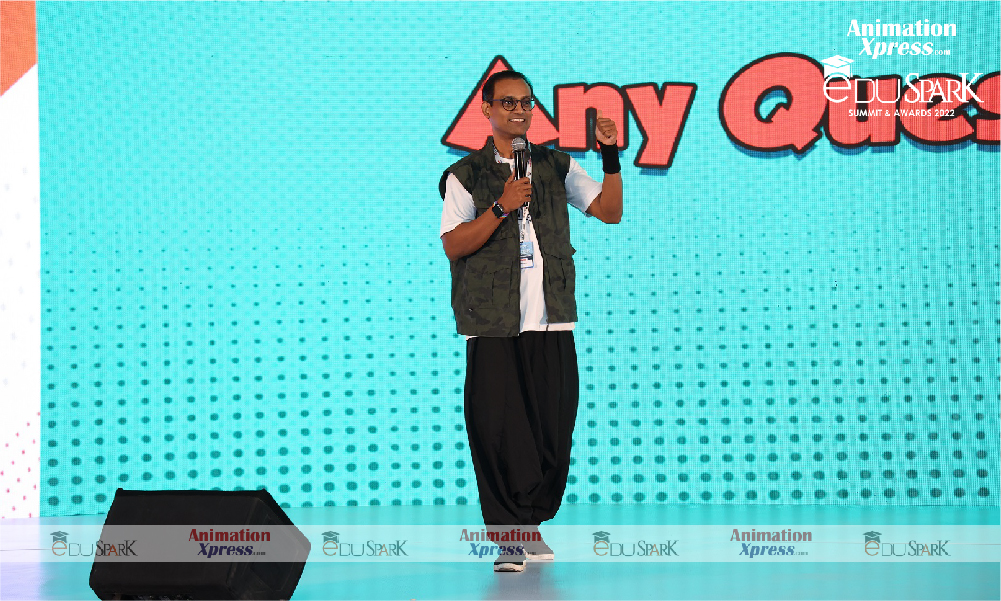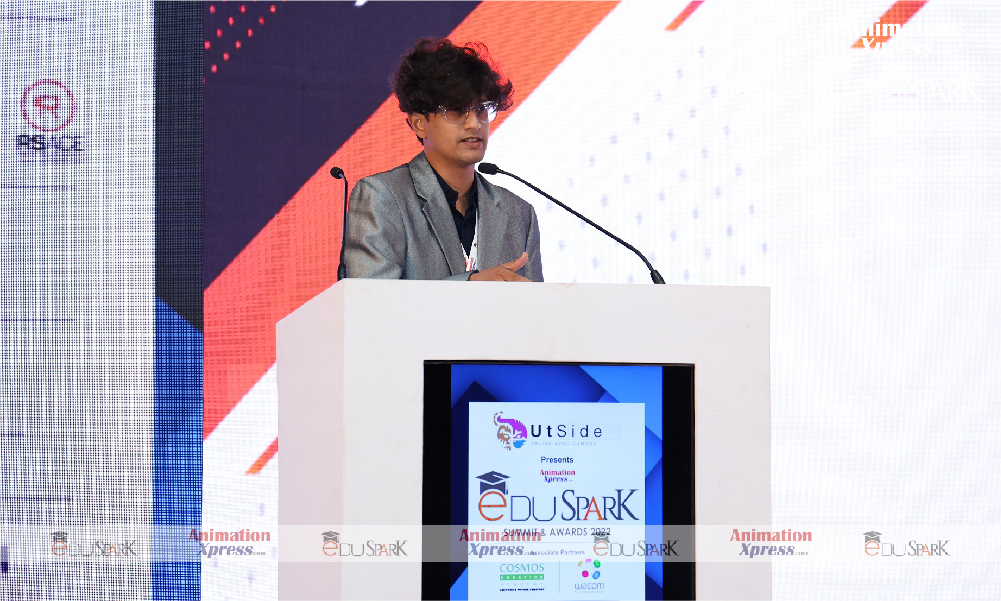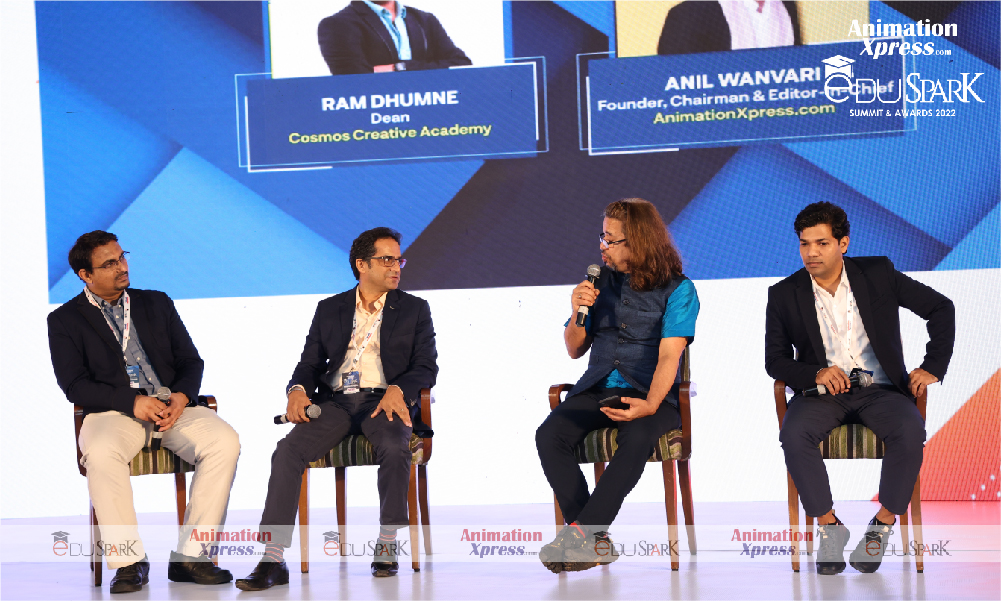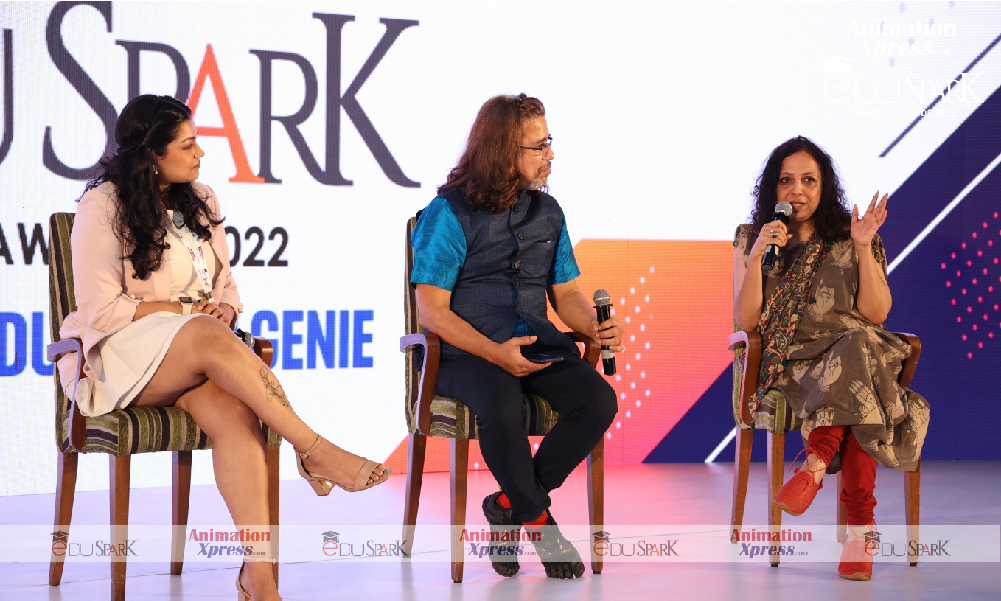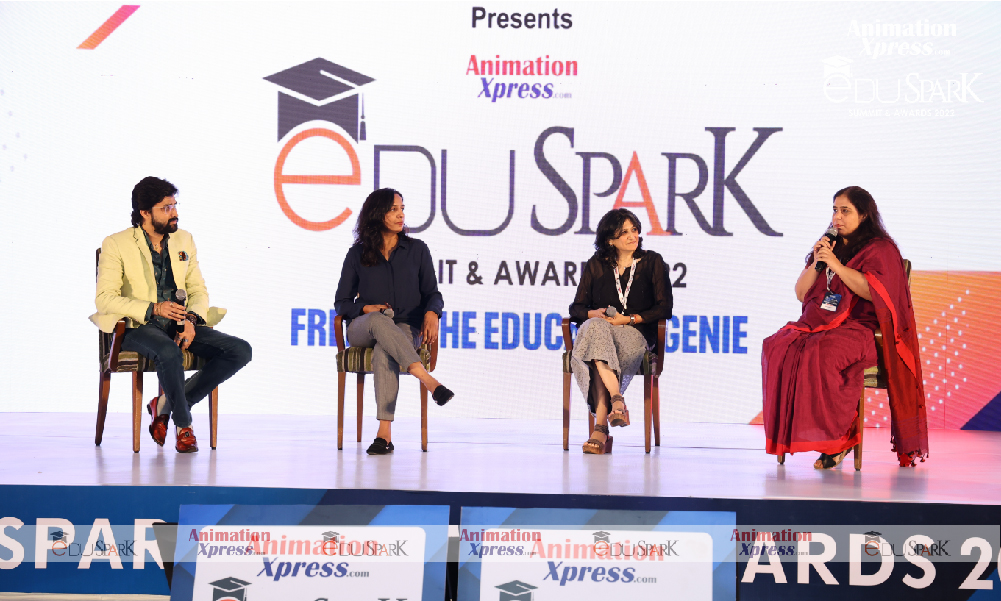
Animation Xpress’ first edition of EduSpark Summit and Awards 2022 took place on-ground on 14 May 2022 at The Lalit, Mumbai. The event witnessed a turnout of more than 650 plus people which included speakers, delegates, and students. EduSpark Summit turned out to be an insightful and knowledgeable affair. There were several sessions lined up, right from meet the makers to fireside chats and panel discussions. The host for the day was Avant Garde Films founder Sohini Mitra. EduSpark Summit and Awards were presented by Utside, with Associate Partners Cosmos Creative Academy and Wacom India, and Industry partners Ramesh Sippy Academy of Cinema and Entertainment, Asifa India, Huion and Career Guidance Partner Creative Multimedia.
The event began with Animation Xpress founder, chairman and editor-in-chief Anil Wanvari calling up his core team to speak about the vision behind organising EduSpark Summit and Awards, and the team in unison mentioned that they wanted to have an offline get-together event, where the students can connect with the institutions, studios and experts from the industry to get proper guidance and the team hopes to conduct more education based events in future. It was followed by the lighting of the lamp ceremony which was carried by Wanvari, Punnaryugg Artvision founder and FICCI AVGC forum chairman Ashish Kulkarni, Technicolor country head and ABAI president Biren Ghose, Ramesh Sippy Academy of Cinema and Entertainment managing director and Ramesh Sippy Entertainment Pvt Ltd director Kiran Sippy, Vedatma Animation Studio CEO, ABAI secretary, Arena Animation (Malleswaram and Rajajinagar, Bengaluru) director Srinivas Sribhakta. Wanvari asked the dignitaries to stay back on the dais and asked them about where they see the AVGC industry five years down the line. Ashish Kulkarni said, “We, as an industry, are pushing the government to create policies so that the students have a pathway where they are guided and have the option to get into AVGC from first grade.” He said that the students should be ready to join the industry with proper guidance in the future. Biren Ghose said, “Five years down the line, the AVGC industry will grow three times. Students should develop an eye for the visual sense.” Kiran Sippy shared that she is loving the policies that the government is coming up with and the perception is changing as opposed to the earlier times when students were wasting their time doing something that they didn’t like. Srinivas Sribhakta mentioned, “We have come a really long way. Awareness has been gradually created. Everyone is creative, it is just about exploring. It is important to keep upgrading yourself. Five years down the line, the hybrid model of teaching is going to remain.” At the end of the session, Wanvari said that five years from now he hopes to see more students and studios attending the EduSpark event.
The first session after the inauguration ceremony was on ‘Making of Angry Maushi’ by Abhijeet Kini Studios founder Abhijeet Kini. In the session, Kini talked about his work experience, the kind of work he does and the workshops that he conducts across various institutes. Kini showed a live demo of comic creation to the audience. He explained some concepts of creating a comic book in detail. He then spoke about some of his creations like Angry Maushi, Temper Temper, Ek Din Ka Hero and others and revealed from where he draws the inspiration to develop characters for his comics. Kini shared, “I love telling stories based on Mumbai, and I love experimenting with character exaggeration.” When asked by the students how to intern with him and how to go about making a career in the comic industry, he replied, “Develop your own style, do not make comics based on Mangas or any other comics.”
The following session was on ‘Making of The King’s Man’, which was conducted by Framestore CG supervisor Prashant Nair. Initially, Nair spoke about his work experience across various studios, and then he presented a showreel from Framestore. After that, Nair spoke in detail about the movie The King’s Man and did a VFX breakdown of the film. He went into the nitty-gritties of the production process and spoke in length about the virtual set creation, CG process, and motion capture used for facial expressions so that the audience, especially students, would understand the overall process.
Next up in line was the ‘Launch of UtSide, India’s 1st AVGC Campus’. Representing UtSide in the session was co-founder and managing director Puneet Sharma. Sharma said, “EduSpark is a special event for us and we are happy to launch UtSide here.” He added that in one’s life there is an event which triggers you to become who you are today, similarly one event occurred that somehow led him to create UtSide. Sharma said, “Last two decades have been a turning point for animation and the AVGC industry. After the pandemic, now the demand is for quality content.” He then went on to present to the audience the kind of courses being offered at UtSide and elaborated on course delivery methodology, course intake and structure. He encouraged students to join UtSide for better learning opportunities.
The fourth session for the day was ‘Case studies on VFX & Animation in Advertising’. The session was helmed by Vaibhav More Films’ founder Vaibhav More. More was pleased to be a part of an offline event such as EduSpark after almost two years of the pandemic. He showed his showreel to everyone present and talked about his work on ads like 7Up, Dixy Scott, APL Apollo and others. He then showcased a VFX breakdown of these ads via video presentation. More said that VFX in advertising is much more different than the VFX pipeline in Hollywood and Bollywood movies. More gave a piece of advice to the students. He said, “Do not restrict yourself to a particular kind of work or animation. Be prepared to work in any software and format. This is the time to explore and find what you are good at.” Upon being asked by students how they’ll get an opportunity to work with him, he told them to send their portfolios via email and mentioned that he will select dedicated candidates to work with him and who love doing their work.
Next was the ‘Making of Mumbai Gullies’ session. The game has been created by Nikhil Malankar who is the founder and CEO of GameEon studio. He shed light on the process that went into creating the game Mumbai Gullies. The game is still in the production stage. Highlighting the inspiration behind creating the game, he said, “I came across games in 2009. I played GTA Vice City, and it provided a lot of liberty to the players to go anywhere in the game. That inspired me to create Mumbai Gullies.” Malankar along with his team demonstrated some interesting elements of the game. He reiterated that the game is not fully developed and just to showcase at the event they have developed the basics. He said, “We spent a lot of attention to the details to make sure the game looks Indian.”
After five amazing sessions, everyone dispersed for the lunch break and were back in an hour for some more interesting sessions from the leading industry experts.
The first session after the lunch break was on ‘Wacom enabling new ways to teach and learn’. The session was conducted by Wacom sales executive Hafiz Shaikh. In this session, Shaikh introduced and gave a brief about the range of products that Wacom has to offer. He explained in detail about various products to the students and encouraged them to buy those products. Upon being asked by a student, Mishra informed about several complementary and EMI schemes available.
The second session after the break was a ‘Fireside chat with Ram Dhumne’. Dhumne is dean at Cosmos Creative Academy, and the session was moderated by Anil Wanvari. Dhumne was accompanied by his colleagues, marketing director Hamza Kazi, and sales director Prashant Purohit on stage to shed some light on the working of their academy. Dhumne said that the academy offers various courses in graphic design, VFX, animation, and much more. He gave a brief introduction about the Cosmos Creative Academy and said, “If students complete the course, we offer them a job at our studio. We conduct creative and technical interviews.” His colleague Purohit said that students of the academy are working on various live projects. Highlighting the goal of the academy, Kazi said, “Our short term goal is to expand exponentially.” Talking about the teachers and their teaching process, Dhumne mentioned, “The faculties are well renowned who have worked on various projects. Their experience is passed on to the students.” In the end, the speakers said how the dynamics and modes of learning and teaching have changed over the years.
The second fireside chat session was on ‘Women in Animation’. The speakers in the session were Green Rain Studios’ creative producer of virtual production Rounak Magoo and Animagic India director Gayatri Rao. This session was also moderated by Anil Wanvari. In this session both the speakers talked about their experiences as women in the animation industry and how things were when they joined and how things have changed over the years. About the mindset of the men and the idea of working with women in animation, Magoo said, “Unlearning has to come from their (men) side.” Bringing to light the experience of working late at night in this industry, Rao said, “There have been times we had to work late, but the studio was run by a woman so there was a trust.” In the end, Magoo said, “It is not easy being a woman, you have to fight through it.”
The second last session of the day was a panel discussion on ‘Catching them young’. The panellists for the session included Seven Rivers International School principal Kavita Sukhani, Somaiya School principal Parveen Shaikh and Toon Club founder Tehzeeb Khurana, and it was moderated by Vedatma Animation Studio CEO, ABAI secretary, Arena Animation (Malleswaram and Rajajinagar, Bengaluru) director Srinivas Sribhakta. The discussion was about how to discover kids’ interest in the arts or AVGC industry at a young age and what steps the schools are taking to discover that and encourage students to get into the arts. Khurana mentioned that people are still not receptive to the idea of arts. When Sribhakta asked how easy or difficult it is for students to convince parents, Shaikh answered, “Convincing parents now has become much easier”, and Sukhani said, “If you have passion then there’s nothing to stop you.” Talking about the post-pandemic scenario, Shaikh said, “People are realising after the pandemic that art is more important.” Answering what kind of courses needs to be taught, Khurana commented, “What we need to give children is the foundation. Softwares will come much later in their education life.” Towards the end, Sukhani said, “There’s no harm in exposing children to technology, but there has to be a balance.” The panel discussion ended with a Q&A session.
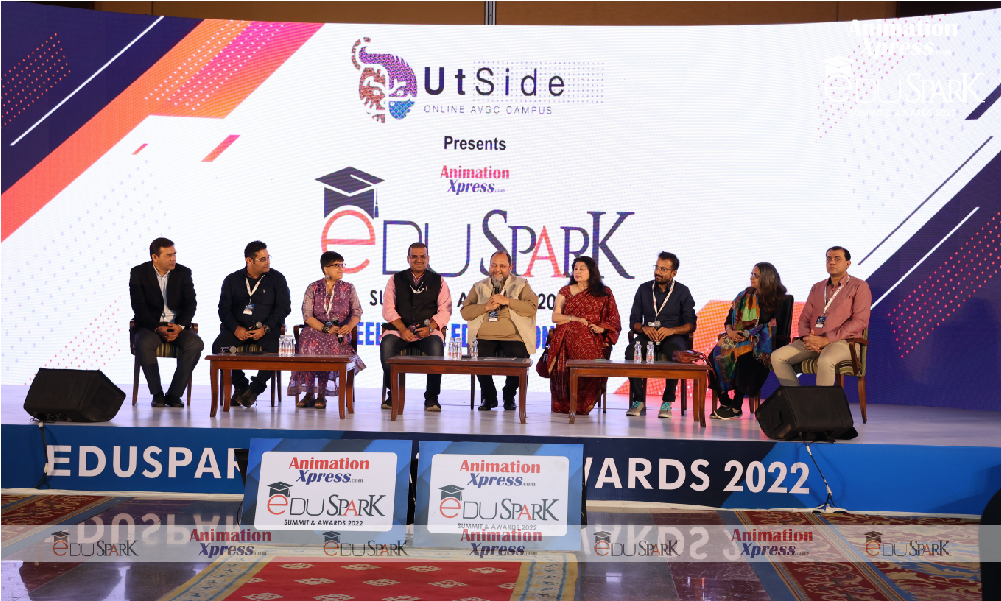
The last session of the day was a panel discussion on ‘Reshaping India’s University Education’. Panellists for the same were MESC CEO Mohit Soni, Ajeenkya DY Patil University – School of Film & Media head of school & professor Dr Manju Rughwani, Arena Animation business partner, Asifa India core committee member & Horizon Institute of Design founder Sanjay Khimesara, Dr Vishwanath Karad MIT World Peace University – school of design assistant professor Dr (H.C.) Ankit Jain, Ramesh Sippy Academy of Cinema and Entertainment managing director & Ramesh Sippy Entertainment Pvt Ltd director Kiran Sippy, L.S. Raheja School of Art principal Radha Ambekar, RD & SH National College head of department of computer science & vice principal Vipul Saluja, and DNEG India head of VFX Jigesh Gajjar. The panel discussion was moderated by Punnaryug Artvision founder & FICCI AVGC forum chairman Ashish Kulkarni. The panellists discussed in length about the new education policy of the Indian government and its benefits to the AVGC sector and students. They also shared the steps taken by their institutions and the kind of courses they offer to students. Jain said, “Once they (students) grow, we do teach them managerial skills as well, as students need to learn every aspect.” Saluja shared, “We being a college and university have lots of courses, but regulations come in from UGC.” He revealed that once in their college ‘no games were allowed’ and now they test games! Ambekar said, “We are running a course which focuses more on graphic designing and advertising and have basic courses of art education. Basics are necessary, after learning basics, students can gradually move towards high-end technology.” The need for students being exposed to studio life was highlighted by Sippy. She said, “Internships are important because that makes students industry ready.” Khimesara mentioned what needs to be taught to kids in school. He said, “Instead of teaching animation at school level, we should teach the foundation.” A question about the job selection process was put forward to which Jain replied, “If you have a riveting portfolio, the doors are open for you.” In the end, Kulkarni gave the remarks that “formal & informal education are equally gearing up.”
That was the end of the EduSpark Summit, and finally it was time for the EduSpark Awards. Various institutes and individuals were awarded for their contribution to the AVGC educational sector. The list of awardees is here.






